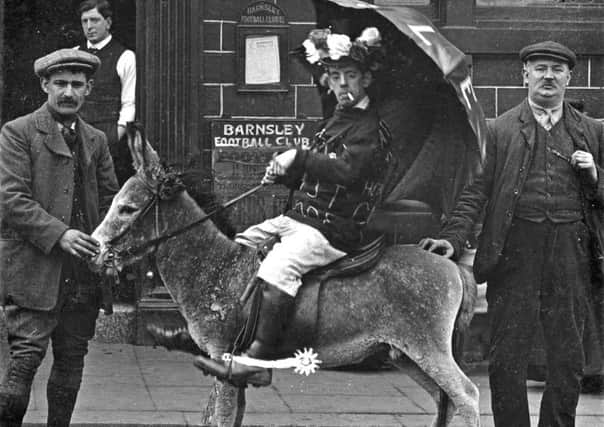Nostalgia on Tuesday: Cup joy for Tykes


This year’s final saw teams costing millions of pounds in transfer fees, with players demanding six-figure sums in weekly wages. But 100 years ago, earnings were capped at £5 a week and teams could sell players for no more than £450. Even then, this was only relevant to the richer clubs.
Barnsley Football Club could not be labelled as such during the early 1900s, being a relatively young company establishing a foothold in Division Two, then the bottom league. The team’s FA Cup exploits of 1912 appear as a more impressive achievement, especially as the side was largely made up of young local players.
Advertisement
Hide AdAdvertisement
Hide AdBarnsley entered the Football League in 1898. The team’s manager for the majority of this period was Barnsley-born Arthur Fairclough, who was also involved in day-to-day business matters at the club. Barnsley’s finances for the first decade of the 20th century were quite precarious and Fairclough was largely responsible for keeping the side afloat.
While the league position rarely strayed from the mid to bottom half of the table, Barnsley had a good home record and increasingly became a strong cup side. The team reached the quarter-finals in 1906, but were defeated by Woolwich Arsenal. Then in 1910 Barnsley went all the way to the final, beating Blackpool, Bristol Rovers, West Bromwich Albion, Queen’s Park Rangers and Everton.
First Division champions Newcastle United, a well-established side, awaited Barnsley at the Crystal Palace Grounds on April 23, 1910.
At 3pm there were about 80,000 spectators in attendance. Barnsley broke the deadlock on 37 minutes with a goal from Harry Tufnell, but Newcastle equalised before the final whistle taking the game to a replay.
Advertisement
Hide AdAdvertisement
Hide AdThe replayed game was held on a rain-sodden pitch at Everton’s Goodison Park ground, in front of 65,000. Barnsley played the same side which served them so well at the previous encounter. They had trained all week at Lytham and arrived in Liverpool about noon.
Unfortunately, during the game the Tykes were undone by two goals in 10 minutes just after the start of the second half. Nonetheless, the team was met by a large crowd on their return home and an illuminated tram car, with the words ‘Barnsley for ever’, attracted a good deal of notice.
The following season, 1910-1911, was a disaster as Barnsley had to apply for re-election to the Football League. The Cup Final team had been retained, but injuries and poor performances saw the Barnsley side slip down the table.
The squad was strengthened during the close season and the first half of the 1911-1912 campaign saw the team do well in the league, leading to expectations of good progress in the FA Cup.
Advertisement
Hide AdAdvertisement
Hide AdBirmingham City, Leicester Fosse and Bolton Wanderers were dispatched to set up a quarter-final with holders Bradford City. A marathon of matches ensued as the initial game, then two replays took place without any goals being scored. In the third replay the score was 2-2 at the end of normal time and the completion of extra time was approaching when George Lillycrop smuggled the ball into the goal.
After beating Swindon Town in the semi-final, through another replay, Barnsley met Division One’s West Bromwich Albion in final at the Crystal Palace Grounds on April 20, 1912. But although both sides had chances the final whistle sounded with no goals and a replay was set up at Bramall Lane, Sheffield, on April 24, 1912.
The same teams were selected for the replay, which was Barnsley’s 12th game in the competition and twice the number they should have played at this stage.
The match went into extra time and with only two minutes left, Tufnell made a direct run at goal from midfield. Beating defenders Pennington and Cook, he ran 50 yards and placed his effort into the far corner of the goal as Pearson came rushing out. There was no chance of coming back for WBA.
Advertisement
Hide AdAdvertisement
Hide AdThe trophy was presented to Barnsley’s captain ‘Archie’ Taylor by FA chairman JC Clegg in front of the 38,555 spectators. Taylor said upon receiving the cup: “I am sure that you will agree with me that Barnsley deserve what they have got today. We played very hard, so have West Bromwich. I thank you on behalf of this gift [laughter] – which we have won on behalf of the town of Barnsley.”
On returning home later in the evening the Barnsley team had a great reception, the crowd probably numbering 30, 000.
Owing to extra time being played, the motor char-a-banc conveying the players did not arrive until 8.45pm by which time all traffic had been stopped in Sheffield Road, and a long force of police, including several mounted, were in evidence.
Outside the club’s headquarters, the Clarence Hotel, wild scenes of enthusiasm took place. It was some time before the players could get into the hotel, and the speeches from the balcony, by the players and officials were only just audible.
Advertisement
Hide AdAdvertisement
Hide AdTaylor, the captain, Travers, ‘Dicky’ Downs, and trainer Norman spoke, and although the crowd called loudly for Tufnell, it was only after much pressure that the hero of the game appeared. He was lifted shoulder-high by his teammates, and the crowd cheered wildly.
Further reading: Lifting the Cup: The Story of Battling Barnsley, 1910-1912 by Mark Metcalf and David Wood.